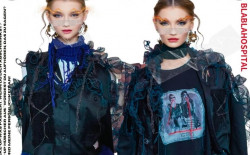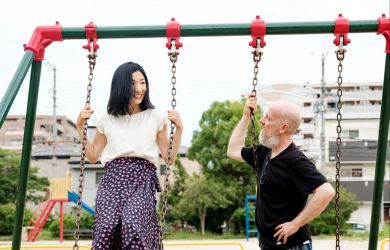
November 27, 2008
Odd Jobs
Foreigners are finding creative ways to make a living in Tokyo
By Metropolis
Originally published on metropolis.co.jp on November 2008

Photos by Benjamin Parks
Not every foreigner in Tokyo is an English teacher—there are also bankers, headhunters and other kinds of teachers, too. Joking aside, expats are doing all manner of jobs here, pursuing passions and paving career paths that a few decades ago would not have been possible. We scoured the city looking for folks making a living in nontraditional ways, and found a diverse group of four Americans, a Canadian, two Brits and a Romanian. Here are their stories.

Age: 34
Hometown: East Brunswick, New Jersey
Occupation: Candy Man
It all started with a talking gumball machine. Then-Nova teacher Brian Tannura, letting his entrepreneurial side get the best of him, ordered one of the devices after seeing it in an American magazine. After he spent the equivalent of two months’ salary on the machine, you can imagine Tannura’s mood after plugging it in and realizing that the hertz didn’t match up.
Gliding through this hiccup, the 34-year-old New Jersey native now manages over 2,000 so-called “flat” vending machines, selling mostly stickers. “There will be 3,000 by end of this year and over 5,000 next year if current projections hold true,” he says.
But it is Tannura’s newest venture, importing and reselling American chocolates and snacks, that has earned him the “Candy Man” moniker. “I hope to follow a path which I first traveled with the sticker business.
In that business, I also began with a small testing period—one machine, followed by five and then ten, etc.,” he says. “I climbed the stairs, so to speak, re-investing profits into additional machines over the course of a few years.”
Are there clear top sellers from the candy boxes he now places in offices around Tokyo?
“Chocolate is always a big hit. I learned that pretty quickly,” he says. Tannura also recalls one encounter with a customer after the machine had sold out of his favorite product. “The ‘cashew man’ took the first chance he saw to grab me by the collar and let it be known in no uncertain terms that it was I who had got him started on his daily fix, and so it was my responsibility to keep him well-supplied.”
Hazards of the job, he reckons.
brian@marketpioneerjapan.com

Age: 41
Hometown: Miami
Occupation: Chainsaw Juggler
Just how does a guy set off on a career track that involves juggling fire, knives and chainsaws while riding a three-meter-tall unicycle and eating an apple? Well, oddly enough, it all began when Paul Masse was studying to become a ninja.
“I came to Japan 14 years ago to train under martial arts grandmaster Hatsumi-sensei, who is also known as one of the last teachers of ninjutsu,” Masse recalls. “The ninja of old used to disguise themselves as they traveled around the country gathering information, and one of the disguises was that of a kyokugei, or street performer. So I feel as though this path was chosen for me, and I can do nothing but follow it.”
Masse’s adventures began with modest shows outside train stations, after which he’d use the money he earned to take the train to where he needed to go. As his audiences grew from just a few people to hundreds, the performances started to “take over my work life,” he says.
Masse now trains in martial arts during the week, and on weekends does shows as part of a two-man performing group called AlleyKatz, which he founded in 1999 with a partner. “I just open up with some random comments and see where it takes us. It is sometimes like ad-lib theater. We have a loose idea of what we have to do but how we do it is different every time.” The duo performs nearly every weekend in Yokohama, either in Yamashita Park or near Landmark Tower.
So, has the job taken its toll physically? “Except for an occasional burn or two and the jammed fingers, no accidents—our guardian angels work overtime!” But then again, Masse is not blind to the potential risks. Just in case, he admits, “We have a special kind of performers insurance.”

Age: 35
Hometown: Bucharest, Romania
Occupation: Tattoo Artist
The website for Dali Rau’s Graphic Tribe tattoo parlor introduces the artist in this way: “I’m ambidextrous, I speak Româna, English and Nihongo more or less fluently, I’m married—to a Japanese woman and to my work—and I seem to be ‘a nice guy.’”
Hailing from Bucharest, Rau arrived in Japan a dozen years ago. “Tattooing brought me here and I can definitely consider myself one of the luckiest people I know,” he says. “Very few compromises had to be made along the way, and there were very few things that I had to give up in order to do this.”
The 35-year-old is a tattoo artist in the truest sense of the word. He vows never to copy someone else’s design—even his own. That would be “unfair and, to a certain degree, unethical,” he says. “I want to be asked to create something that has a meaning and expresses each and every client’s thoughts.”
And who are Rau’s customers? The vast majority are Japanese, ranging from teenagers to one client clearly over 60. “The person skipped the birth date field on the signed agreement, so I can’t really verify,” he says.
Asked if everyone should get a tattoo, Rau smiles. “Absolutely—but not because it’s in fashion or because their favorite rock or movie star has one… not because all their friends have one and they look cool on the beach. Everyone who believes that tattoos can express what words or conventional fashion—i.e., clothes and hairstyles—cannot, everyone who finds tattoos as beautiful as any other form of art, should get a tattoo.”
In Japan, though, that might mean giving up the right to join a fitness club or bathe in some onsen. “Tattooing is still stigmatized,” he concedes, recounting his maddening search for a landlord who would rent him studio space. But the outlook is bright.
“Fortunately, people are starting to understand that tattooing is a form of art and it doesn’t necessarily have something to do with the gangs and all the bad stuff associated with them.”







